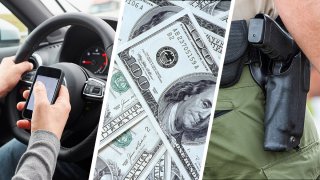
A new year means new laws. Read on for some of the changes in the D.C. area beginning in January 2021.
New Laws in Washington, DC
Expanded Foam Packaging Ban: More goods made of expanded polystyrene can’t be sold in the District. Starting Jan. 1, retailers in D.C. can no longer sell coolers, ice chests, packing peanuts or food in packaging made from expanded polystyrene. (Editor's Note: A previous version of this article referred to this substance as Styrofoam, which is not made from expanded polystyrene.)
Estate Tax Exemption Decrease: More people will have to pay higher estate taxes when the exempt amount is lowered from about $5.7 million to $4 million. The new figures apply to the estate of anyone who dies on or after Jan. 1, 2021. The law firm Buchanan Ingersoll & Rooney says D.C. changed the law to make up for a budget shortfall caused by the pandemic.
Environmental Building Standards: Large, privately-owned buildings and D.C.-owned buildings larger than 10,000 feet are subject to new energy-efficiency standards set by D.C.’s Department of Energy and Environment. The Building Energy Performance Standards are a minimum threshold of energy performance for existing buildings, the city says.
Telemedicine Record-Keeping: Health providers in D.C. must keep certain records on services provided digitally to Medicaid patients for a decade or longer. The “complete and accurate beneficiary records of services” should cover details such as how the patient and health care provider communicated. The records are not supposed to include any video.
New Laws in Maryland
Minimum Wage: The minimum wage in Maryland is going up. On Jan. 1, the rate will increase to $11.75 for people working for employers who have 15 or more employees. It will increase to $11.60 for those working for employers with 14 or fewer employees.
Impoundment (Prince George's County): Effective Jan. 4, the owner of an impounded vehicle will be required to pay any outstanding parking or traffic tickets in addition to towing and storage charges, if the owner either waives a hearing or it is determined at the hearing that there was probable cause to impound the vehicle. The owner may be able to reclaim their vehicle without paying towing and storage charges if a hearing determines there was no probable cause to impound the vehicle. See more here.
Short-Term Rentals (Prince George's County): Effective Jan. 4, it will be illegal for a platform to:
- list a short-term rental by the hour or for any period shorter than 24 hours
- list a short-term rental more than once within any 24-hour period, measured from the start of one rental to the start of the next
- advertise an hourly rate or any rate for any period shorter than 24 hours
- list short-term rentals that rent for multiple bookings or for the same or overlapping time periods
Air Conditioning in Rental Properties (Prince George's County): Effective Jan. 11, any air conditioning equipment provided by a landlord must be properly installed, connected and maintained, and it must be able to generate temperatures at a certain level, of no more than 80 degrees.
New Laws in Virginia
Concealed Handgun Permits: Anyone who applies for a permit starting on Jan. 1 to carry a concealed handgun must take a firearms training or safety course in person, not online or by video, as the law previously allowed. The law still requires the firearms instructor to be certified by the state or the National Rifle Association.
State lawmakers approved a number of gun control measures in 2020, including a red flag bill to allow authorities to temporarily take guns away from people deemed to be dangerous to themselves or others, and legislation giving local governments more authority to ban guns in public places.
Holding a Cellphone While Driving: It’s illegal to hold a cellphone while driving in Virginia, starting Jan. 1. The previous law only prohibited holding a phone while driving in a work zone, and reading or typing an email or text while driving.
Violations are punishable with a fine of $125 the first time, and $250 for repeat offenses. Anyone who’s caught using a phone in a work zone will get a $250 fine. You’re still allowed to talk on the phone while driving, just not to hold the phone.
There are some exceptions, including for anyone making an emergency call, and for operators of emergency vehicles. Go here to see the state’s Drive Smart public information campaign on the new law.
The Cost of Insulin: Virginia residents who use insulin will get some financial relief. A law goes into effect Jan. 1 that prohibits health insurance companies from making patients pay more than $50 for a 30-day supply. The law will apply regardless of the type or amount that a person needs. Go here to see the bill.
Driver's permits for undocumented immigrants: Undocumented immigrants in Virginia will be able to apply for a long-awaited special driver's permit. Known as a driver's privilege card, Virginia residents can start applying for one Jan. 2.
Classifying Workers as Independent Contractors: Employers who misclassify employees as independent contractors face new penalties as of Jan. 1. Workers will be considered employees unless the worker or employer demonstrates the worker is a contractor.
Violators are subject to fines and being barred from winning public contracts. Go here to see the bill.
Surprise Medical Bills: Virginians will get some additional help with unexpected medical bills. A law that goes into effect Jan. 1 says that when someone with health insurance gets “emergency services from an out-of-network health care provider or receives out-of-network surgical or ancillary services at an in-network facility, the enrollee is not required to pay the out-of-network provider any amount other than the applicable cost-sharing requirement.” That cost-sharing requirement “cannot exceed the cost-sharing requirement that would apply if the services were provided in-network.” Go here to see the bill.
Samantha Akinduro contributed to this report.